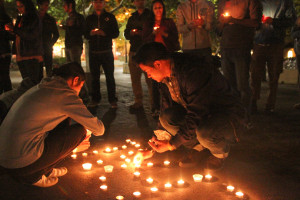
On Wednesday night, Sanskriti, Stanford’s South Asian undergraduate organization, held a vigil to honor the lives lost in the earthquake that struck Nepal on April 25. Several students, community members and others working on earthquake relief efforts spoke at the vigil, sharing their thoughts and experiences. There were also tables set up with representatives from nonprofit organizations working to provide aid and laptops for people to donate money.
One such representative was Tom Wagner from Green Building Associates in San Francisco, who has been working for three years to build greenhouses in Nepal so that villagers can grow food year-round. After the earthquake, however, Wagner said he shifted his focus.
“Now that the earthquake has hit we’ve decided to redirect our efforts to earthquake relief,” Wagner said.
The vigil was not the first effort by members of the Stanford community to address the aftermath of the disaster in Nepal. At Mela, Sanskriti’s annual South Asian spring festival that was held on May 3, there was an information booth about the earthquake and relief efforts, and Curry Up Now, the food truck at the festival, donated a portion of its proceeds from the event to a nonprofit organization working in Nepal.
“In response to the earthquake, several different student and staff-led initiatives started to pop up on campus,” said Kunal Sangani ’16, one of the co-chairs of Sanskriti.
Sangani said that Sanskriti was able to coordinate different efforts and initiatives on campus.
“A lot of people were looking for…a platform for their initiatives to be spread to other members of the Stanford community and many people were looking for guidance about where they should contribute their money…so Sanskriti, as the South Asian organization, …was the natural platform for these other initiatives to gather around,” Sangani said. “Our core worked incredibly hard over the past week to reach out to everyone in the Nepali community on campus as well as [the] Center for South Asia…to sort all the activities together and share them through a common platform.”
In addition to bringing together different groups on campus and individuals already working on different relief efforts, Sanskriti also created a list of nonprofit organizations as a resource for people who wanted to know where to donate money.
“There was…a lot of confusion about who to reach out to, and…since Sanskriti was doing a lot of work in coordinating the various groups…Student Activities and Leadership asked us to put together an official list and be the designated VSO for coordinating campus activities,” Sangani said. The four organizations Sanskriti chose are Global Giving, the American-Nepal Medical Foundation, UNICEF and Direct Relief.
Sangani made clear, however, that those four organizations are not the only ones worthy of donations, and many people in the Stanford community already have their own projects with different groups.
“One of the problems…that we ran into is a lot of the students and staff that have been working on campus to respond to the situation in Nepal have created independent crowd-sourcing platforms that they’ve used to channel to local NGOs that they know are doing really great work instead of these international NGOs,” Sangani said. “We want to not only…have this short list of organizations that we can recommend to the Stanford community but also highlight these student and staff initiatives.”
“The goal behind the event [the vigil] was to consolidate all the efforts that a lot of people on Stanford’s campus have been doing essentially for Nepal, said Nicole Dalal ’16, the other co-chair of Sanskriti. “There are a lot of different fundraising campaigns and awareness campaigns and people just wanting to share their stories and their experiences… so the goal was to bring together as many people as possible to share their stories and also to fundraise for different causes as well.”
Sangani added that the vigil on Wednesday night was the place for people to talk about those independent initiatives. In anticipation of the vigil, Sangani expressed hope that it would provide a way to connect students to the tragedy in Nepal who might not be connected with the Nepali community.
“I think it’s really important that the Stanford community collect to just honor those lives lost, but especially for students not intimately associated with Nepal or with South Asia in any way…this is a great opportunity for them to hear from Nepali students,” Sangani said. “I don’t think most people have heard from Nepali students on campus recently, and it’ll be great to hear how that community is reacting and what people can do to help.”
Karan Mathur ’17, a member of Sanskriti core, also said he thought the vigil provided a good opportunity for students to gain awareness who might not otherwise know what’s going on in Nepal.
“Stanford is very diverse and we’re so lucky to have such a diverse student body, but it’s very easy to forget about…other…disasters when you’re in the Stanford bubble,” Mathur said. “It’s really good that we do have representatives from Nepal, people whose families are there, people who have lived there, at least visited there, and are really bringing the awareness…we have a fair number of people here really listening and understanding the magnitude of…what happened.”
Looking ahead, Sanskriti wants to be able to keep up awareness about what’s happening in Nepal and maintain efforts to help earthquake victims.
“There’s usually a funding stop that occurs about a month after the disaster,” Sangani explained. “That’s something that was noticed with the Filipino typhoon a few years back, so…we’re hoping to keep pushing some of the information throughout the rest of the spring and hopefully at the beginning of next year… We have a pretty quick attention span as an international community to things like this, so having a more sustained effort is pretty key, and we’re hoping to provide that in some ways.”
Contact Sarah Wishingrad at swishing ‘at’ stanford.edu.